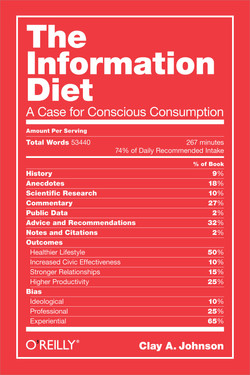
The main point of the book is to consider your intake of information similar to your food diet. Which is quite apt: one of the ways to stay healthy is to not overconsume. Well the same applies to information, because we tend to consume information sitting down, which isn’t healthy when done for long stretches of time and we tend to live inside an echo chamber of information that affirms our ideas, which makes it hard for us to stay objective. The author therefore proposes we follow an Infovegan diet, which mirrors a diet by Michael Pollan: “Eat food. Not too much. Mostly plants.”
As a Google Reader junkie, I know how addictive an endless stream of information can be. Clay Johnson gives several tips for battling this so you end up with a maximum of 6 hour consumption of information. First off, turn off your notifiers for things as email and social media. Second, install something like RescueTime to get an insight in how you spend (or waste) your time and set goals on how to improve these stats.
The book ends with a rally to be more considerate about where you get your information from (more locally produced), try to act on things that can make a change NOW and...
Although I already tried doing most things the author recommends in the book, they somehow never were enough to kill my information addiction (heck, I read this book didn’t I?). However, I feel like this book has reemphasized the need to change and gave some actionable goals to try and limit my intake to more reasonable levels.
If you’re an information junkie like me and are interested in some change in perspective, then this may certainly be a book for you.
